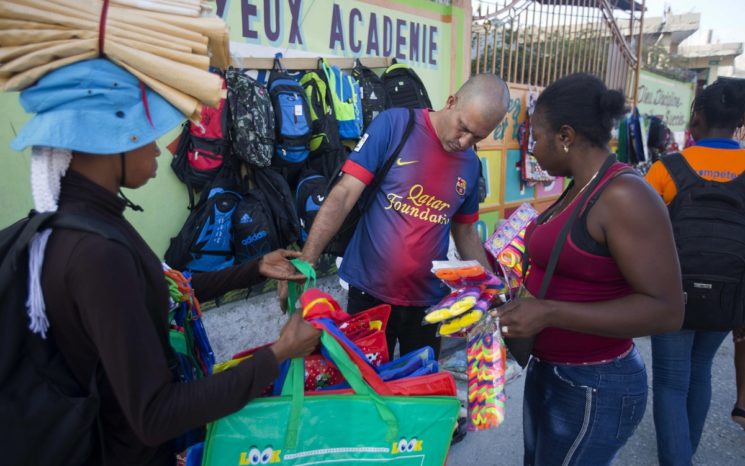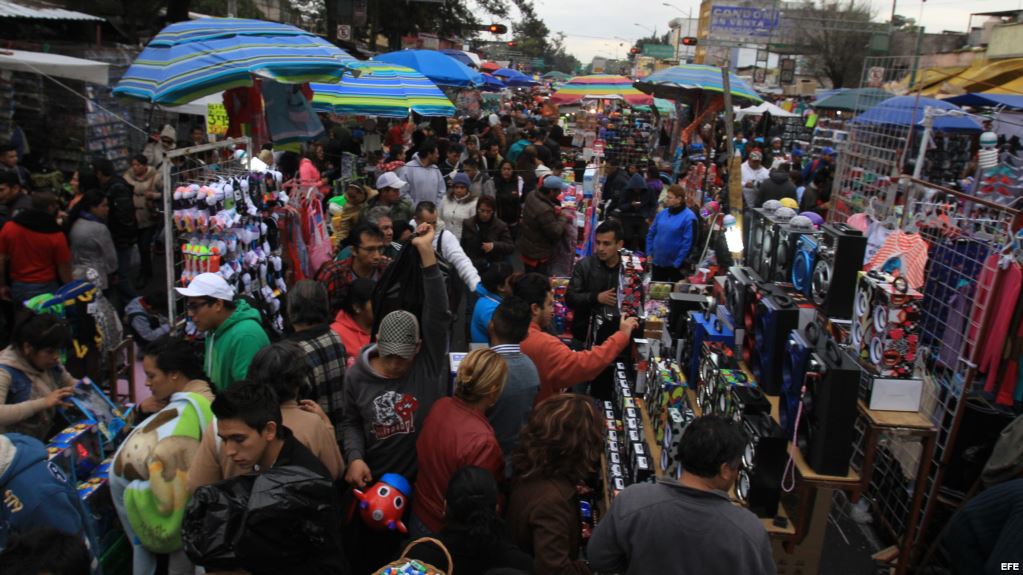 MILES DE CUBANOS ENCUENTRAN EN HAITÍ UN FABULOSO DESTINO DE COMPRAS.
MILES DE CUBANOS ENCUENTRAN EN HAITÍ UN FABULOSO DESTINO DE COMPRAS.
Cada tarde, cientos de cubanos revolotean por una encrucijada llena de baches en la capital del país más pobre del hemisferio buscando ropa, bombillas, perfumes y otros productos que escasean en su país.
Los vendedores haitianos ponen reggaetón cubano a todo volumen para atraer a la clientela. En un café abierto hace un año, decorado con banderas cubanas pintadas, Angelina Luis Domínguez, natural de La Habana, y su sobrina Yeleny Terry Luis sirven frijoles negros, arroz y cerdo asado a sus compatriotas a la hora de comer. “Hay miles, por todos [lados]”, dijo Domínguez. “Antes eran cuatro o cinco; ahora se ha minado. Es Cuba que creo que está aquí”.
El “mercado cubano” de Puerto Príncipe forma parte de un comercio global estimado en más de $2,000 millones, alimentado por la confluencia entre el incremento de la libertad de los cubanos para viajar con el continuo control que ejerce el estado comunista en la economía en el país. Ropa, artículos de hogar, hardware, productos de cuidado personal y otros cuestan dos o tres veces más en las tiendas estatales en Cuba que en otras partes. Y eso cuando están a la venta en una economía lastrada por una escasez incesante. Es más, el monopolio estatal cubano de importaciones y exportaciones excluye al pequeño pero vibrante sector privado, que emplea a más de medio millón de personas que suelen ganar tres o cuatro veces el salario de un empleado estatal.
Haití, que lucha contra el incremento de la violencia y la devaluación de la moneda, parece estar quedándose con una porción cada vez mayor del pastel de las compras cubanas.
En el vecindario que rodea al mercado, docenas de cubanos gestionan alojamientos con desayuno para los compradores en viviendas alquiladas a haitianos. Docenas de “guías” locales ayudan a los visitantes a encontrar artículos especializados como electrónica y hardware.
“Tengo visa de Panamá, visa de México, pero me gusta Haití”, señaló Eduardo Leiva, quien gestiona un pequeño negocio de hardware en Cuba. “Hay mucha variedad de mercancía, hay un nivel de productos que de verdad no hay en otros países”.
La pequeña aerolínea Sunrise Airways opera 12 vuelos directos semanales entre La Habana, Camaguey y Santiago, en Cuba, y Puerto Príncipe. Los cubanos entrevistados en el mercado dijeron que gastaron alrededor de $700 en pasajes aéreos, comida y alojamiento y otros $700 en mercancías, que revenden a un precio suficientemente alto para obtener varios cientos de dólares de beneficio en cada viaje.
La mayoría señalaron que hacían viajes casi mensuales, generando más de $2,000 en ingresos extra al mes en un país en el que los salarios estatales anuales están por debajo de los $400.
“Los cubanos son muy buenos para nosotros. Vienen, se llevan la mercancía de vuelta a su casa y nosotros podemos sacar un pequeño beneficio”, dijo Terese Rencher, quien compra camisetas con logos de diseñadores fabricadas en Perú en República Dominicana y las vende en el “mercado cubano”. “Así es como mandé a mi hija a la escuela, a la universidad”, dijo Rencher, que explicó que la joven de 23 años estudia en una escuela de hostelería en Puerto Príncipe.
Desde que Cuba eliminó un odiado permiso de salida hace cinco años, los cubanos llenan vuelos a lugares con requisitos de entrada fáciles. En Puerto Príncipe, la ciudad de Panamá, Cancún, Guyana, Trinidad y Tobago, e incluso en Moscú, llenan sus maletas con artículos para uso personal y los venden de regreso en su país.
“Comparado con Rusia, Haití está más cerca, no hace frío y la mercancía es prácticamente la misma”, dijo el taxista Braulio Hernández, quien buscaba herramientas y piezas para su taller de reparación de autos.
Este tipo de turismo de negocios ha diversificado un comercio centrado durante mucho tiempo en el sur de Florida. Alejar ese comercio de Miami derivó de la decisión del gobierno de Donald Trump de sacar a la mayor parte del personal de su embajada de la capital cubana el año pasado, lo que terminó con el procesamiento de visas en la isla y obligó a los cubanos a viajar a terceros países para solicitar permiso para visitar Estados Unidos.
 THOUSANDS OF CUBANS FIND A FABULOUS PURCHASE DESTINY IN HAITI.
THOUSANDS OF CUBANS FIND A FABULOUS PURCHASE DESTINY IN HAITI.
Every afternoon, hundreds of Cubans flit through a bumpy junction in the capital of the hemisphere’s poorest country looking for clothes, light bulbs, perfumes and other products that are scarce in their country.
The Haitian vendors put Cuban reggaetón at full volume to attract the clientele. In an open café a year ago, decorated with painted Cuban flags, Angelina Luis Domínguez, a native of Havana, and her niece Yeleny Terry Luis serve black beans, rice and roast pork to their countrymen at lunchtime. “There are thousands, for all [sides],” Dominguez said. “Before there were four or five; now it has been mined. It’s Cuba that I think is here. ”
The “Cuban market” of Port-au-Prince is part of a global trade estimated at more than $ 2 billion, fueled by the confluence between the increased freedom of Cubans to travel with the continuous control exercised by the communist state in the economy in the country. Clothing, household items, hardware, personal care products and others cost two or three times more in state stores in Cuba than elsewhere. And that when they are for sale in an economy weighed down by an incessant scarcity. Moreover, the Cuban state monopoly of imports and exports excludes the small but vibrant private sector, which employs more than half a million people who usually earn three or four times the salary of a state employee.
Haiti, which is fighting against the increase in violence and the devaluation of the currency, seems to be keeping a growing share of the Cuban shopping pie.
In the neighborhood that surrounds the market, dozens of Cubans manage accommodations with breakfast for buyers in homes rented to Haitians. Dozens of local “guides” help visitors find specialized articles such as electronics and hardware.
“I have a visa from Panama, a visa from Mexico, but I like Haiti,” said Eduardo Leiva, who manages a small hardware business in Cuba. “There is a lot of variety of merchandise, there is a level of products that really do not exist in other countries.”
The small airline Sunrise Airways operates 12 weekly direct flights between Havana, Camaguey and Santiago, in Cuba, and Port-au-Prince. Cubans interviewed in the market said they spent around $ 700 on airfare, food and lodging and another $ 700 on merchandise, which they resell at a price high enough to earn several hundred dollars of profit on each trip.
The majority indicated that they made almost monthly trips, generating more than $ 2,000 in extra income per month in a country where annual state salaries are below $ 400.
“The Cubans are very good for us. They come, they take the goods back home and we can make a small profit, “said Terese Rencher, who buys T-shirts with logos from designers made in Peru in the Dominican Republic and sells them in the” Cuban market. ” “This is how I sent my daughter to school, to university,” said Rencher, who explained that the 23-year-old girl is studying in a hotel school in Port-au-Prince.
Since Cuba eliminated a hated exit permit five years ago, Cubans fill flights to places with easy entry requirements. In Port-au-Prince, Panama City, Cancun, Guyana, Trinidad and Tobago, and even in Moscow, they pack their bags with items for personal use and sell them back in their country.
“Compared to Russia, Haiti is closer, it’s not cold and the merchandise is practically the same,” said taxi driver Braulio Hernández, who was looking for tools and parts for his auto repair shop.
This type of business tourism has diversified a trade focused for a long time in South Florida. Moving away from that Miami trade stemmed from the decision of the Donald Trump government to remove most of the staff from its embassy in the Cuban capital last year, which ended with the processing of visas on the island and forced the Cubans to travel to third countries to request permission to visit the United States.
Agencies/ The Herald/ Marta Oliver/ Extractos/ Internet Photos/ Arnoldo Varona/ www.TheCubanHistory.com
THE CUBAN HISTORY, HOLLYWOOD.








